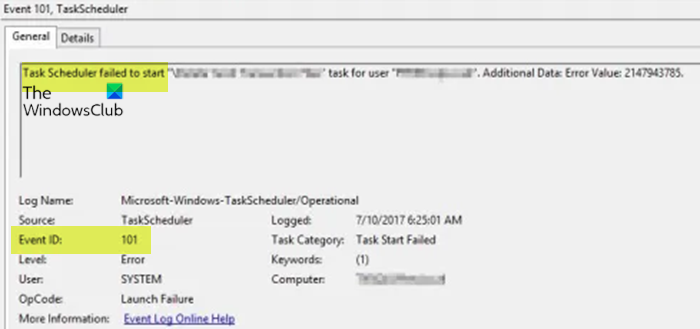Task Scheduler failed to start, Event ID 101
If your schedules task fails to run and you see the Task Scheduler failed to start with Event ID 101 in Event Viewer, you can try our recommended solutions below in the order presented below to have the issue promptly resolved on your machine. Let’s have a quick look at the description of the listed solutions.
1] Add user to ‘Log on as a batch job’ group
The main culprit to the Task Scheduler failed to start – Event ID 101 on Windows 11/10 client machine or Windows server was revealed to be permissions-related. The applicable fix here is to simply add the user to the “Log on as a batch job” property on the server or client machine as the case may be. To perform this task, do the following:
Press Windows key + R to invoke the Run dialog.In the Run dialog box, type secpol.msc and hit Enter to oprn the Local Security Policy console.In the console, on the left navigation pane, click Local Policies to collapse the section.Now, click User Rights Assignment.On the right pane, double-click on Log on as a batch job policy to edit its properties.In the Properties window, click the Add User or Group button to add the appropriate username to the group.Finally, click Apply > OK to save changes.Exit Local Security Policy console.
Next time the job runs, it should run successfully without issues. Read: Task Scheduler not running or starting programs
2] Make sure Task Scheduler service is set to Automatic and running
It’s possible the issue you are currently facing is due to the Task Scheduler service is disabled and not running or not set to automatic startup which is the default setting on your machine. To rule out this possibility, you need to make sure Task Scheduler service is set to Automatic and running. To perform this task, do the following:
Press Windows key + R to invoke the Run dialog.In the Run dialog box, type services.msc and hit Enter to open Services.In the Services window, scroll and locate the Task Scheduler service.Double-click on the entry to edit its properties.In the properties window, click the drop-down on the Startup type and select Automatic.Next, make sure the service is started by clicking the Start button if not greyed out.Click Apply > OK to save changes.Restart PC.
If this service is set to automatic and running but the issue in hand persists, try the next solution. Read: System error 1058 has occurred, The service cannot be started
3] Delete and recreate the Task
Before you do this, you can try running the task manually in Task Scheduler and see if the job runs successfully. You can refresh the history of the tasks by pressing F5 or clicking the refresh button. If it fails to run manually you can troubleshoot it from there until it does run manually. Otherwise this solution as a last-ditch effort requires you to delete the scheduled task if the task is not too complicated and then recreate the task from scratch. Hope this post helps you! Related post: Error 0xFFFD0000, PowerShell script does not run as Scheduled Task
How do I fix Task Scheduler not working?
If the Task Scheduler stops automatically or is not running on your Windows 11/10 system, you can try the following suggestions:
Check and start Task Scheduler serviceChange the Service configurationStart Task Scheduler using Command Prompt
What is launch failure in Task Scheduler?
It’s an RDS server, so it reboots every morning. After it reboots, a warning message shows in history for the task “Task Scheduler did not launch task “Task” as it missed its schedule. Consider using the configuration option to start the task when available, if the schedule is missed.” Fix: Task Scheduler service is not available error
How do you find out why a scheduled task failed?
To find out why a scheduled task failed on your Windows 11/10 PC, see below for a checklist you can use to figure out what have caused the task to fail:
Check if the task has been enabled. Right-click the task, and then click Properties.Check the scheduled time.Check the task’s status.View the log file of scheduled tasks.
What is Event ID 110?
Event ID 110 is normally logged when a user manually launches a task. Event ID 129 indicates the process ID of a task that has run. Event ID 200 contains information about the action defined in the scheduled task.

